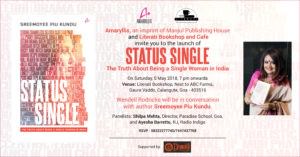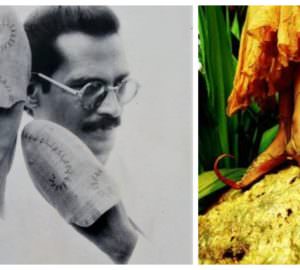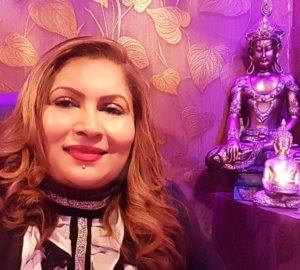I’m a single woman-mother, ambitious career woman-professional, ferociously independent, and don’t I know this first hand. The Author, Sreemoyee Piu Kundu launches her book on May 5th at Literati Bookshop in Goa, and our free-wheeling interview throws up the same culprit – Prejudice, Prejudice, Prejudice. Time we put this perpetrator in place. Hain na?

ED: What is the book about?
SPK: Status Single is India’s first non-fiction on a staggering 74 million women who are either unmarried, widowed, separated, divorced, abandoned with kids, disabled or belonging to the LGBTQ population, who form 21% of this country’s population. It is my story of being a 40-year-old single woman in India, who belongs to a middle class family, has to work to earn her keep, has been through the scorching humiliation of the arranged marriage market, tried dating online briefly, and now lives with her aging parents, fostering the daughter of their house help, interspersed with interviews of 3000 single women I interviewed all over India over a year.
ED: What does being a `single’ woman mean in India? And yes, let’s detail the `baggage’ please
SPK: Being single challenges the age-old script of patriarchy and male validation – and it’s never going to be easy in this country to be the other – like gay people, we are a marginalized community whose voice is never really registered or their true stories heard.
Also, as a single child I have found that the fear of being left alone in this world is daunting – because we have been brought up as little girls to think of our wedding day – your mother always says she will give you her wedding sari or your father says he will buy you the polka set you long for if you ‘find a nice guy.’ That’s the highest benchmark of personal achievement and also for the longest time women have fed their insufficient and fragile egos with the looks, achievements, wealth of their ‘husband,’ wearing the title of ‘wife,’ like a crown, and then adding ‘mother,’ like winning a jackpot. I think it’s very challenging for a woman like me to even exist in social media where there is a slew of happy family albums, baby shower shoots and then women revealing every inch of their married life – gooey relationship status updates/changes, children’s report cards and generally making you feel like an outcast. That and the real time alone-ness and void after coming back home, the failure of romantic relationships, the prospect of one’s own health problems post 40, especially, the all consuming urban loneliness, superficial new age friendships and the perils of being on your own in the most daunting life circumstances.
ED: The single woman as a career woman dilemma can be best explained as….
SPK: If you see the cover of the book, which is an amalgamation of words that were crowd sourced on social media, the word ambitious and overqualified features quite high up because there is a perception that if a woman is both of the above, she must be married to her job/must have put settling down by a certain age on the back burner, and there is a high degree of patronizing with which a successful woman’s life is seen here – like even if she is heading an MNC, buying herself diamonds/sedans and paying hefty home loans and being a caregiver to her family – she either must have slept her way to the top/has avoided marriage and motherhood. Also, in the workplace, a tough single boss faces a lot of backlash with female colleagues often bitching behind her back, saying things like ‘she needs to get laid/is moody’ when she demands perfection/is no-nonsense when it comes to deliverables. Inversely, sometimes superiors overwork a single woman telling her she has no reason to head home early, as she’s free of domestic chores and responsibilities. A lot of women who get divorced hide this fact from their colleagues, scared that they will be a subject of vile gossip and finger pointing or being seen as lonely, sexually needy and therefore a soft target for sexual favors and inappropriate sexual favors.

ED: What is the future for the growing self aware woman who chooses to remain single, from the family, society, career perspective
SPK: The future is bright, since the percentage of single women is growing at a rate of 39% and we have more single women than ever before in India. But what matters is financial independence, emotional adequacy and a supportive peer and family structure, and also families being progressive and encouraging their daughters to foster their dreams and stand on their two feet, rather than hankering and pressurizing them into marriage by a certain socially demarcated age.
ED: In the global phenomenon of #MeToo what is your personal experience in the Indian context. Why have women of this country not created a wave of protest against it?
SPK: There has hardly been any stirring here, and that’s because India sees talking about sexual abuse as the right thing to do – it’s because there is no sexual education integrated into the curriculum. Sex is seen as dirty and a lot of shame and guilt is attached to conversations on sex – so abuse is always associated with shame and guilt for the woman, like she invited this energy and there are consequences like social ostracization, loss of face for the family, career damages and in general women lack agency and consent over their own bodies. There is a regressive moral policing of a woman’s voice and this leads to a culture of slut shaming that silences a woman into a victim.
ED: Why have women editors sitting across the country not used the power of their medium to force the government machinery to give girls and women of India a better quality of life and rights at work, at the judiciary or the legislature?
SPK: Media houses in this country are owned by big business houses that are pandering to political parties, sadly, and Editors are reporting to marketing honchos who are reporting to owners of papers, who are possibly mouthpieces of a political party/faction. So, there is hardly any autonomy in the Press and most media operates on paid news reports, and women editors while having a moral obligation towards their own sex, are ultimately paid employees who hardly can exercise free will.
ED: Five single women whose lives inspire you and why?
SPK: From my book, Gauri Sawant, transgender activist and single mother to 14-year-old Gayatri who she rescued from a red light area in Mumbai when the child at four was being sold by pimps after the death of her sex worker mother, to AIDS. Gauri who is now fighting for adoption rights for single transgender mothers.
Shantala M, a widow in Bangalore who after the death of her spouse, found herself to be the main breadwinner for her two kids, in-laws and parents, and being only a class 12 pass out, she started giving English lessons, and today runs a huge company invested in soft skills training.
Apsara Reddy, AIADMK party spokesperson and first transgender Editor of a paper in Chennai who fights for mainstreaming of her community, and has herself faced a great deal of stigma when she transitioned from Ajay to Apsara.
Malini Parmer, single mother, who in her late 30’s adopted two sisters from an orphanage in Orissa and started her own waste management company.
Monikanika Guha works with an IT firm in Bangalore, victim of marital rape, who raised her daughter, now aged eight, single-handedly after her husband refused to accept her kid, saying it wasn’t his since she used to travel a lot thanks to her marketing profile, leading to her walking out of the marriage.
ED: Woman: Future Forward is?
SPK: To live with dignity, to be independent, to own our body, and speak in our own voices.
`Single Status’ by Sreemoyee Piu Kundu
Book available: In all stores.
Amazon Link: https://www.amazon.in/Status-Single-Truth-About-Being/dp/9381506906



